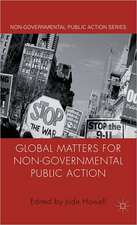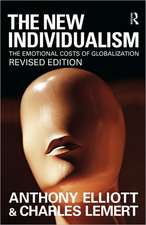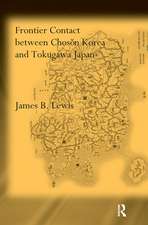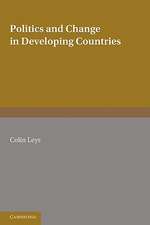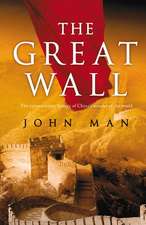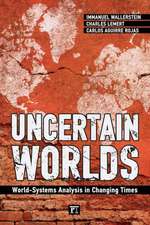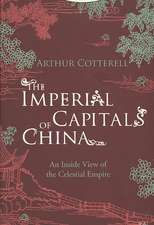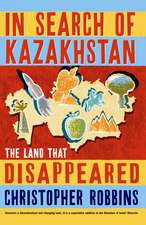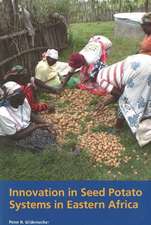Globalization: A Reader
Editat de Charles Lemert, Anthony Elliott, Daniel Chaffee, Eric Hsuen Limba Engleză Hardback – 29 mar 2010
Here, for the first time in print, is the full historical story of globalization – drawn from original sources, explained by accessible introductions and biographical commentaries, and clearly organized as a comprehensive teaching text to guide students through the ins and outs of globalization. With astonishing social, political and historical depth, the book ranges from the Babylonian and Persian empires in Mesopotamia to the global electronic economy of the 21st century, from ancient Greece and imperial Rome to transformations in contemporary state power and global inequalities. From Kenichi Ohmae to Al Gore, from Osama bin Laden to Timothy Garton-Ash, from Amartya Sen to Abdou Maliq Simone: this is a dazzling collection of the most important academic and public statements on globalization.
Throughout, the Editors expertly guide the reader through the complex terrain of globalization – its engaging histories, its transnational economies, its multiple cultures and cosmopolitan politics.
| Toate formatele și edițiile | Preț | Express |
|---|---|---|
| Paperback (1) | 433.91 lei 43-57 zile | |
| Taylor & Francis – 29 mar 2010 | 433.91 lei 43-57 zile | |
| Hardback (1) | 1347.07 lei 43-57 zile | |
| Taylor & Francis – 29 mar 2010 | 1347.07 lei 43-57 zile |
Preț: 1347.07 lei
Preț vechi: 1642.77 lei
-18% Nou
Puncte Express: 2021
Preț estimativ în valută:
257.77€ • 269.81$ • 214.54£
257.77€ • 269.81$ • 214.54£
Carte tipărită la comandă
Livrare economică 31 martie-14 aprilie
Preluare comenzi: 021 569.72.76
Specificații
ISBN-13: 9780415464772
ISBN-10: 0415464773
Pagini: 472
Ilustrații: 23 b/w images, 18 halftones and 5 line drawings
Dimensiuni: 189 x 246 x 25 mm
Greutate: 1.03 kg
Ediția:1
Editura: Taylor & Francis
Colecția Routledge
Locul publicării:Oxford, United Kingdom
ISBN-10: 0415464773
Pagini: 472
Ilustrații: 23 b/w images, 18 halftones and 5 line drawings
Dimensiuni: 189 x 246 x 25 mm
Greutate: 1.03 kg
Ediția:1
Editura: Taylor & Francis
Colecția Routledge
Locul publicării:Oxford, United Kingdom
Public țintă
Postgraduate and UndergraduateCuprins
Introduction: Globalization: Fluid Concept, Multiple Reality Part 1: The Age of Empires, 3000BCE – 1500 CE The Imperial Disposition & Civilizational Empires 1.1 Egypt, The Narmer Palette (c. 3100 BCE) 1.2 Persia: Zarathustra, Avesta (9th/10th Centuries BCE) 1.3 Vedic Civilization India: Rig Veda (10th Century BCE) 1.4 Mesopotamia: The Epic of Gilgamesh (1200 BCE/ 700 BCE) 1.5 Ancient Israel: The Yahwist Myth of Creation and Fall (10th Century BCE) 1.6 China: Zhou Dynasty: Mencius on the Mandate of Heaven (c. 370 BCE - c. 290 BCE) 1.7 Arabia: Mohammad, Qu'ran & The Treaty of Hudabiyya 1.8 The Americas: The Abenaki Creation Story (3,000 BCE) 1.9 Greece: Homer, Iliad (725-675 BCE) Imperial Systems, Conflict, and Expansion 1.10 Egypt: Ramses II, The Battle of Kadesh (c. 1273 BCE) 1.11 Babylonia: Achaemenid Empire (550 - 330 BCE), Cyrus the Great 1.12 The Peloponnesian War (431 – 404 BCE): Thucydides 1.13 Alexander the Great of Macedonia: Plutarch 1.14 Post-Alexandrine Empires: Ptolemy I, The Rosetta Stone (196 BCE) 1.15 India: The Myuran Empire, Edicts of Ashoka 1.16 Rome, the Republic: Cicero (106 BCE - 43 BCE), de Re Publica 1.17 Rome, the Empire: Augustus, Deeds of Augustus (Res Gestae Divi Augusti) 1.19 Korea: Samguk Sagi: Unified Silla and the T'ang Dynasty 1.20 China: Fall of the Qin and the rise of the Han dynasty Instability and Decline in Global Empires 1.21 The Americas: Mayan Civilization, The Dresden Codex 1.22 Africa: Ibn Hawkal on the empires of Ghana and Mali 1.23 Japan: the Kojiki to the Edo Period 1.24 Americas: The Incas, Pachacuti Inca Yupanqui (1438 - 1471) 1.25 Rome, the decline: Constantine & Augustine of Hippo 1.26 Mississippian Trading Zone: Cahokia Mounds (c. 1000 - 1100) 1.27 The Ottomans: Breach to the West 1.28 Meso-America: The Conquest of New Spain Part 2: The Modern World System & Industrial Capitalism, 1500 – 1914 The European Voyages of Exploration and Discovery in the 16th Century 2.1 European World Economy 2.2 The Scandinavian Probes to North America 2.3 The Iberian Discoveries of the Americans 2.4 The English Settlements in North America 2.5 The Iberian Circumnavigation: Ferdinand Magellan The Interstate System & Colonization: After 1648 2.6 The Peace of Westphalia 2.7 America in the European Imagination 2.8 Early Trade Routes to the East: Marco Polo & the Silk Road 2.9 The Colony as the Gulag of Undesirables: Australia 2.10 The Colony as Wholly Owned Subsidiary: Leopold and the Belgian Congo 2.11 Pax Britannica & the Colonization of Civil Virtues The New Sciences of Global Imagination 2.12 The New Psychology of the Migrating Self: Descartes 2.15 Print & Literacy: Gutenberg & Luther 2.14 Longitudinal Reckoning 2.16 The War Machine: Land & Sea 2.17 Weights & Measures 2.18 Steam & Thermodynamics: Robert Boyle & James Watt 2.19 Steel & Heavy Industry: Bessemer 2.20 On the Origin of Species: Darwin Part 3: The Short Twentieth Century: Global Uncertainty and Restructuring Revival of Empire, Global Wars, & Europe’s Decline: 1914-1945 3.1 Assassination of Archduke Ferdinand 3.2 The Great War of 1914 & Europe’s Lost Imperium 3.3 End of Dynasty & Nationalism in China, 1911 3.4 Versailles & the 30 Years war with Germany 3.5 Lenin and the Soviet Union, 1917 3.6 Japan and the Cult of the Emperor 3.7 National Socialism in Germany 3.8 The American Century, 1941 The Cold War as a Struggle for Global Control: 1946-1975 3.9 The Iron Curtain 3.10 The American Threat & Stalinism Ideology 3.11 The Soviet Threat & the Principle of Deterrence 3.12 Great Britain & Suez Crisis 3.13 Sponsored Resistance to Hegemonic Intrusions: Ho Chi Min Decolonizing Struggles: 1947 to 1962 3.15 Negritude and Violence 3.16 The Expulsion of the British and Partition of South Asia 3.17 The Leninist State with Buddhist Pretension: Mao’s Defeat of Nationalism 3.18 Congo: Patrice Lumumba 3.19 Cuba as the Thorn in the Flesh of the American Hegemony Global Forces Crash the Gates in the Global Centers: 1963 to 1991/2001 3.21 Asian influences on the American Civil Rights Movement Martin Luther King, "My Trip to the Land of Gandhi", Malcolm X, "The Black Muslim Movement" 3.22 The Velvet Revolution Vaclav Havel, " 3.23 The Post-Colonial Nightmare in Africa: Zaire 3.24 Tiananmen Square: 1989 3.25 Perestroika & Glasnost: Gorbachev / 1989-91 3.26 The World Social Forum: Porto Alegre Part 4: The Great Globalization Debate Globalists 4.1 Kenichi Ohmae 4.2 Manuel Castells 4.3 Peter Dicken 4.4 Ulf Hannerz 4.5 Thomas Friedman Anti-Globalists 4.6 Paul Hirst and Grahame Thompson 4.7 Naomi Klein 4.8 Robert Gilpin 4.9 R.J. Barry Jones 4.10 Alan M. Rugman and Richard Hodgetts Transformationalists 4.11 Anthony Giddens 4.12 David Held and Anthony McGrew 4.13 Project for the New American Century 4.14 Aihwa Ong 4.15 Al Gore 4.16 Ulrich Beck Post-Globalists 4.17 Zygmunt Bauman 4.18 Arjun Appadurai 4.19 Fredric Jameson 4.20 Justin Rosenberg Part 5: Globalization Since 2001-Present 9/11 and its Aftermath 5.1 Osama bin Laden 5.2 Slavoj Zizek 5.3 Joseph S. Nye, Jr. 5.4 Noam Chomsky Global Governance 5.5 The Commission on Global Governance 5.6 James N. Rosenau 5.7 David Held 5.8 G. John Ikenberry 5.8.5 Danilo Zolo Cultural Globalization, Global Culture 5.10 John Tomlinson 5.11 Tyler Cowen 5.12 Stuart Hall 5.13 Albert Paolini 5.14 Roland Robertson Globalizing Regions 5.15 Francis Fukayama 5.16 Samuel Huntington 5.17 Stanley Hoffman 5.20 Peter Kwong and Dusanka Miscevic 5.21 Doug Guthrie 5.22 Timothy Garton-Ash 5.23. Anthony Giddens and Ulrich Beck Part 6: Global Futures: Time and Tense Post-Contemporary Globalisms 6.1 Gilles Deleuze and Felix Guatari 6.2 Michael Hardt and Antonio Negri 6.3 Saskia Sassen 6.4 John Urry Global Civil Society in the Cosmopolitan Age 6.5 Amartya Sen 6.6 John Keane 6.7 Mary Kaldor 6.8 Kwame Anthony Appiah 6.10 Pheng Cheah Globalization and Personal Life: Intimate Globalism 6.11 Julia Kristeva 6.12 Dennis Altman 6.13 Nikos Papastergiadis 6.14 Jean-Luc Nancy 6.15 Judith Butler Information Technology & Assemblages 6.16 Paul Virilio 6.17 Giorgio Agamben 6.18 Manuel DeLanda 6.19 Achille Mbembe 6.20 AbdouMaliq Simone An Inconclusive Word, After the Crash of 2009
Notă biografică
Charles Lemert is the Andrus Professor of Sociology at Wesleyan University, USA and Visiting Research Professor at Flinders University, Australia.
Anthony Elliott is Professor of Sociology at Flinders University, Australia and Visiting Research Professor at Open University, UK.
Daniel Chaffee is Associate Lecturer in Sociology at Flinders University, Australia.
Eric Hsu is a PhD candidate and Associate Lecturer in Sociology at Flinders University, Australia.
Anthony Elliott is Professor of Sociology at Flinders University, Australia and Visiting Research Professor at Open University, UK.
Daniel Chaffee is Associate Lecturer in Sociology at Flinders University, Australia.
Eric Hsu is a PhD candidate and Associate Lecturer in Sociology at Flinders University, Australia.
Recenzii
'This reader is an education in itself. A student who reads this rich collection carefully will be able to think intelligently about the world in which we are living and where we are heading. Bravo.' – Immanuel Wallerstein, Senior Research Scholar, Yale University, USA
'Globalization achieves several important objectives: it destroys the naïve sociological belief that globalism is a recent development; it interweaves the historical rise and fall of empires with global processes; it gives due recognition to the interaction of culture, technology and war; and it puts pay to the notion that globalization is just westernization. With a feast of readings, it provides a comprehensive and interdisciplinary overview of the debates. Authoritative and judicious, Globalization is a significant achievement.' – Bryan S. Turner, Presidential Professor of Sociology at the Graduate Center, the City University of New York, USA
'What a marvelous compendium! Globalization: A Reader is a Wunderkammer, a social-critic's desk-book, a provocative yet elegantly expressed argument about history, especially as domination, and a serious effort to construct a canon useful across several academic disciplines. In short, for students in the broadest and best sense, there is a great deal of real education to be had here. But while Globalization surely has much to teach anyone, it is also a book to be savored. At least for an aging imperialist like me, the book's vaguely Edwardian stance, its insistence on decorum while discussing moral compromise, and worse, along with its dryly horrified tone and finely wrought diction, make Globalization an excellent choice for leafing through on a cold evening, in the library, preoccupied with sin and perhaps distracted by a good whisky. Well done indeed.' – David Westbrook, Professor of Law, University of Buffalo, USA
'This thoughtful and sophisticated reader offers students the opportunity to pass through all the vexing dichotomies in today's scholarly discourse: the universal and the particular, the historical and the contemporary, the classical and the postmodern views of globalization. Pedagogically sound. The right stuff for the wrong times.' – Keith Doubt, Professor of Sociology, Wittenberg University, USA
'This is the collection I have been waiting for. It puts globalization in its appropriate historical context: reaching from 5,000 years ago to the near future. It is only within this broad sweep of history that we can see what is truly new now in the twenty-first century. These readings and their careful introductions show that much of what passes for new in popular accounts, is not new at all, but has been going on for millennia. They illustrate that globalization or at least globalization-like processes have been occurring, with many variations for a long time. Furthermore, today is not the end of time as some have argued, the only a prelude to what comes next. With this broad approach, we gain a better chance of figuring out what sorts of things might come next, and how to act in order to improve the chances of those changes we want, and prevent those we do not want.' – Thomas Hall, Professor of Anthropology, Depauw University, USA
'Globalization achieves several important objectives: it destroys the naïve sociological belief that globalism is a recent development; it interweaves the historical rise and fall of empires with global processes; it gives due recognition to the interaction of culture, technology and war; and it puts pay to the notion that globalization is just westernization. With a feast of readings, it provides a comprehensive and interdisciplinary overview of the debates. Authoritative and judicious, Globalization is a significant achievement.' – Bryan S. Turner, Presidential Professor of Sociology at the Graduate Center, the City University of New York, USA
'What a marvelous compendium! Globalization: A Reader is a Wunderkammer, a social-critic's desk-book, a provocative yet elegantly expressed argument about history, especially as domination, and a serious effort to construct a canon useful across several academic disciplines. In short, for students in the broadest and best sense, there is a great deal of real education to be had here. But while Globalization surely has much to teach anyone, it is also a book to be savored. At least for an aging imperialist like me, the book's vaguely Edwardian stance, its insistence on decorum while discussing moral compromise, and worse, along with its dryly horrified tone and finely wrought diction, make Globalization an excellent choice for leafing through on a cold evening, in the library, preoccupied with sin and perhaps distracted by a good whisky. Well done indeed.' – David Westbrook, Professor of Law, University of Buffalo, USA
'This thoughtful and sophisticated reader offers students the opportunity to pass through all the vexing dichotomies in today's scholarly discourse: the universal and the particular, the historical and the contemporary, the classical and the postmodern views of globalization. Pedagogically sound. The right stuff for the wrong times.' – Keith Doubt, Professor of Sociology, Wittenberg University, USA
'This is the collection I have been waiting for. It puts globalization in its appropriate historical context: reaching from 5,000 years ago to the near future. It is only within this broad sweep of history that we can see what is truly new now in the twenty-first century. These readings and their careful introductions show that much of what passes for new in popular accounts, is not new at all, but has been going on for millennia. They illustrate that globalization or at least globalization-like processes have been occurring, with many variations for a long time. Furthermore, today is not the end of time as some have argued, the only a prelude to what comes next. With this broad approach, we gain a better chance of figuring out what sorts of things might come next, and how to act in order to improve the chances of those changes we want, and prevent those we do not want.' – Thomas Hall, Professor of Anthropology, Depauw University, USA
Descriere
Globalization offers a unique compilation of the major statements - across historical periods, political contexts, intellectual perspectives and academic disciplines - on the globalization debate, expertly guided by the editors. No other book that manages to wrap together the debates - historical and contemporary, academic and public - as does Globalization.



